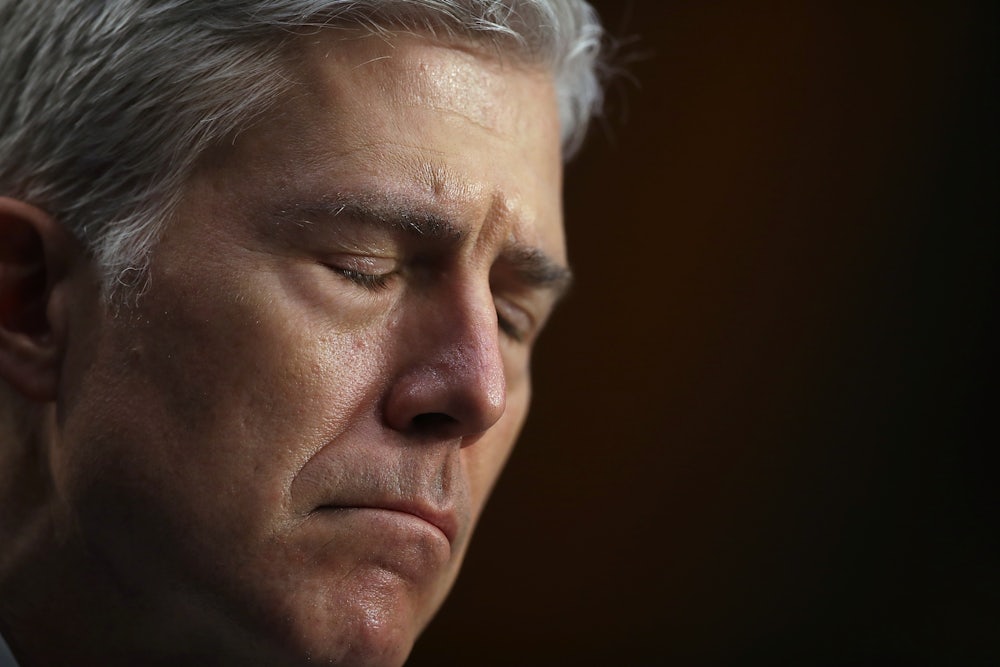In 1997, then-Justice Antonin Scalia voted with the majority in Babbitt v. Youpee, where the court ruled that the federal government couldn’t transfer a Native American man’s land to his tribe instead of his heirs if he died without a will unless his family was compensated for it. Years later, the man’s granddaughter, April Youpee-Roll, had the opportunity to meet Scalia at a book-signing event in Washington.
When it was her turn to meet the justice, she mentioned her grandfather’s case, and Scalia, to his credit, remembered the facts of it. Then, according to her account of the meeting, he offered up a one-line quip that spoke volumes about the American legal system and tribal sovereignty. “You know,” Scalia reportedly told her as he handed her back the signed book, “when it comes to Indian law, most of the time we’re just making it up.”
It would be hard to find a better expression of that sentiment than Wednesday’s ruling in Oklahoma v. Castro-Huerta. The Supreme Court ruled for the first time in its history that states have concurrent jurisdiction with the federal government to prosecute a broad swath of crimes in Indian country, dealing a grievous blow to tribal sovereignty. The 5–4 ruling by Justice Brett Kavanaugh shreds almost 200 years of precedent and practice to satisfy Oklahoma’s desire to reverse its defeat two years ago in McGirt v. Oklahoma, where the court recognized that half of the state was still Indian country.
“After McGirt, about 43 percent of Oklahoma—including Tulsa—is now considered Indian country,” Kavanaugh wrote. “Therefore, the question of whether the State of Oklahoma retains concurrent jurisdiction to prosecute non-Indian on Indian crimes in Indian country has suddenly assumed immense importance.”
Justice Neil Gorsuch, who authored the McGirt ruling, dissented from Wednesday’s ruling with the judicial equivalent of undisguised fury. “Where this Court once stood firm, today it wilts,” he wrote, referring to the historical backdrop of state encroachments on tribal sovereignty and Chief Justice John Marshall’s rejection of them in a landmark 1832 case. “Where our predecessors refused to participate in one state’s unlawful power grab at the expense of the Cherokee, today’s court accedes to another’s.”
Criminal jurisdiction in Indian country was a complicated matter even before Wednesday’s ruling. Generally speaking, the states prosecute crimes within their borders when they involve only non-Indian perpetrators or victims, or when a tribal member isn’t on tribal land. Tribal governments also often have the discretion to prosecute most nonmajor crimes involving only tribal members within their borders. For more serious crimes between tribal members, or in almost any case involving a non-Indian and a tribal member on tribal land, jurisdiction falls to the federal government. (There are caveats and exemptions that aren’t relevant here, so please don’t use this summary to prosecute anyone in state, federal, or tribal court.)
The ostensible question for the Supreme Court was who had the authority to prosecute the non-Indian defendant, Victor Manuel Castro-Huerta, for child neglect toward his stepdaughter, who is a member of the Cherokee Nation. The state of Oklahoma originally charged and convicted him under state child-neglect laws after his arrest in 2015. While his case was on appeal, the Supreme Court handed down its ruling in McGirt and recognized half of Oklahoma as Indian country once again. Oklahoma’s state courts vacated Castro-Huerta’s conviction on jurisdictional grounds, and the federal government successfully reprosecuted him soon thereafter.
I say “ostensible” because the real issue in this case was whether Oklahoma could circumvent McGirt’s effective return of tribal sovereignty within a large portion of that state. The state’s executive branch, led by Governor Kevin Stitt, has frequently criticized the court’s 2020 ruling and sought ways to limit or scrap it. When the Oklahoma attorney general’s office asked the Supreme Court to review the state court ruling in Castro-Huerta’s favor last year, it also asked the justices to consider whether McGirt should be overturned—a virtually unprecedented request for a decision where the ink was barely dry.
Oklahoma claimed that the move was necessary because the McGirt ruling had allegedly led to chaos for its criminal justice system. The state’s claims, in turn, were disputed by both the tribal governments and reporters who found some of its statistical claims to be exaggerated at best. When the court agreed to hear the case last year, the justices explicitly declined to reconsider McGirt. But Oklahoma’s tales of a Supreme Court ruling run amok and criminals going free on mere technicalities apparently resonated with some of the justices: Kavanaugh wrote that the court took up the case “in light of the sudden significance of this jurisdictional question for public safety and the criminal justice system in Oklahoma.”
To get around McGirt, Oklahoma took aim at the root of tribal sovereignty itself. The state argued that it has concurrent jurisdiction to prosecute most crimes in Indian country, meaning that it could do so if the federal government could not or would not. Oklahoma’s challenge was that the practice and policy of the last two centuries pointed in the other direction. In 1832, the court ruled in Worcester v. Georgia that the state of Georgia could not exercise jurisdiction within Cherokee lands because the Cherokee Nation was a separate sovereign.
“The Court’s decision was deeply unpopular, and both Georgia and President Jackson flouted it,” Gorsuch recounted in his dissenting opinion in Castro-Huerta. “But in time, Worcester came to be recognized as one of this Court’s finer hours. The decision established a foundational rule that would persist for over 200 years: Native American tribes retain their sovereignty unless and until Congress ordains otherwise. Worcester proved that, even in the ‘courts of the conqueror,’ the rule of law meant something.”
Congress built upon that understanding in 1834 when it passed the General Crimes Act, which filled the jurisdictional void left by Worcester by establishing federal jurisdiction over crimes committed “by and against” non-Indians on tribal land. The Senate also signed a treaty in 1836 with the Cherokee Nation in which the United States pledged to protect the tribe from the interference of “state sovereignties.” Though the court later ruled that states could prosecute crimes between non-Indians on tribal land, Gorsuch noted, “at least one promise remained: states could play no role in the prosecution of crimes by or against Native Americans on tribal lands.”
In his dissent, Gorsuch emphasized that this was the virtually unchallenged understanding of federal law for nearly two centuries: by Congress, by the executive branch, and by the courts. He pointedly noted that this understanding was also why Oklahoma fought so hard to get the court not to recognize the reservation’s continued existence in McGirt. “The last time Oklahoma was before us, it asked this court to usurp congressional authority and disestablish the Creek Reservation because, otherwise, the state ‘would not have jurisdiction over’ ‘crimes committed against Indians’ within its boundaries.”
Kavanaugh, writing for the majority, disagreed. He rejected Castro-Huerta’s reading of the GCA as treating Indian country like a federal enclave as nonsensical. “By its terms, the [General Crimes] Act does not preempt the state’s authority to prosecute non-Indians who commit crimes against Indians in Indian country,” he wrote. “The text of the Act simply ‘extend[s]’ federal law to Indian country, leaving untouched the background principle of state jurisdiction over crimes committed within the state, including in Indian country.” More generally, he went on to write, since tribal lands fall within a state’s territory, the “default” assumption is that state laws apply. “States do not need a permission slip from Congress to exercise their sovereign authority,” Kavanaugh wrote.
Gorsuch strenuously disagreed with every aspect of Kavanaugh’s conclusions: his reading of federal law, his understanding of the historical context, his approach to the court’s relevant precedents, and more. On the GCA in particular, Gorsuch noted that Congress plainly meant to analogize Indian country to other federal enclaves—military bases, national parks, and so on—despite Kavanaugh’s claims to the contrary. And he rejected what he saw as the basic illogic of the majority’s reading of the statute. “Again, nothing here purports to extend state criminal laws to tribal lands,” Gorsuch wrote. “Quite the contrary. It would hardly make sense to apply federal general criminal law—to address all crimes ranging from murder to jaywalking—if state general criminal law already did the job.”
On the “default” argument, Gorsuch said the court had committed a fundamental error in its understanding of sovereignty. “Tribes are not private organizations within state boundaries,” he wrote. “Their reservations are not glorified private campgrounds. Tribes are sovereigns. And the preemption rule applicable to them is exactly the opposite of the normal rule. Tribal sovereignty means that the criminal laws of the states ‘can have no force’ on tribal members within tribal bounds unless and until Congress clearly ordains otherwise.” He pointed to other recent cases, including one a few weeks ago, where the court had emphasized the tribes’ distinct sovereign interests.
There is ample reporting about the bitter friction behind the scenes at the Supreme Court. Some of the justices themselves have implicitly and explicitly acknowledged it. Even if they hadn’t, it could be readily inferred from some of the caustic language between the majorities and the dissenters in this term’s cases on abortion rights and the Second Amendment, and in some of its shadow-docket rulings on voting rights. There is no shortage of deep animosity in American politics these days, and the high court is far from immune to it.
Even against that caustic backdrop, the two opinions in Castro-Huerta read like a knife fight broke out during the justices’ first conference after oral arguments in the case. The rancor between Gorsuch and Kavanaugh is even more remarkable because, unlike in similar cases this term, it doesn’t fall along the usual ideological lines. It’s between two justices who agree with each other in about nine out of 10 cases. Either the other justices tried and failed to get the two of them to tone it down, or they agreed with it.
Gorsuch, who often takes a special interest in tribal cases, denounced the court’s ruling in sweeping terms. He wrote that the majority’s assertion that states can exercise jurisdiction “comes as if by oracle, without any sense of the history recounted above and unattached to any colorable legal authority” and added that “a more ahistorical and mistaken statement of Indian law would be hard to fathom.” The court, he explained, “proceeds oblivious to the rule that only a clear act of Congress may impose constraints on tribal sovereignty” and “makes a mockery of all of Congress’s work from 1834 to 1968.”
These “astonishing errors,” as Gorsuch put it, run counter to fundamental doctrines when it comes to tribal sovereignty. He said the majority “seeks to cast blame for its ruling on a grab bag of decisions issued by our predecessors,” which he argued the majority still misread, and said its failure there “leaves the Court to assemble a string of carefully curated snippets—a clause here, a sentence there—from six decisions out of the galaxy of this Court’s Indian law jurisprudence,” which he argued it yet again misread and took out of context.
He even described the majority’s ruling as not just erroneous but one of the worst in its history. “This Court may choose to ignore Congress’s statutes and the Nation’s treaties, but it has no power to negate them,” he wrote. “The Court may choose to disregard our precedents, but it does not purport to overrule a single one. As a result, today’s decision surely marks an embarrassing new entry into the anticanon of Indian law.” The “anticanon” is a term used by legal scholars to describe opinions that are universally condemned and egregiously wrong; in some contexts, it’s reserved for decisions like Dred Scott v. Sandford and Korematsu v. United States.
This is not even the full extent of Gorsuch’s criticism—he also delves into Oklahoma’s claims of post-McGirt anarchy, the majority’s apparent misuse of a balancing test, and more—but I think you get the point by now. Thankfully, he effectively summarized most of his objections to the ruling in a single paragraph:
In recounting all this, I do not profess certainty about the optimal law enforcement arrangements in Oklahoma. I do not pretend to know all the relevant facts, let alone how to balance each of them in this complex picture. Nor do I claim to know what weight to give historical wrongs or future hopes. I offer the preceding observations only to illustrate the one thing I am sure of: This Court has no business usurping congressional decisions about the appropriate balance between federal, tribal, and state interests. If the court’s ruling today sounds like a legislative committee report touting the benefits of some newly proposed bill, that’s because it is exactly that. And given that a nine-member court is a poor substitute for the people’s elected representatives, it is no surprise that the Court’s cost-benefit analysis is radically incomplete. The Court’s decision is not a judicial interpretation of the law’s meaning; it is the pastiche of a legislative process.
That may seem relatively tame by the standards of modern American political discourse, and it is, but within the context of the Supreme Court it is a roundhouse kick. Usually the author of a majority opinion responds to a dissenter’s claims in passing or not at all; lengthy rebuttals are rare. Kavanaugh opted for the latter path. He wrote that Gorsuch’s position was “inconsistent with the Constitution’s structure, the states’ inherent sovereignty, and the court’s precedents” and said that his colleague “characterizes the Court’s opinion in several ways that are not accurate.” Kavanaugh also chastises him for using what he described as “extraordinary rhetoric” to articulate his “deeply held policy views about what Indian law should be.”
Kavanaugh’s most forceful pushback came against the dissent’s efforts to describe some limits to the majority’s holding. Toward the end of his dissent, Gorsuch noted that Wednesday’s ruling could be read narrowly by lower courts, since other tribes might have different historical legal agreements with federal authorities that change the analysis here. “For that matter, even when it comes to the Cherokee the Court leaves much unanswered,” Gorsuch added. “The Court does not confront the relevant text of the Cherokee’s treaties, the Oklahoma Enabling Act, or the relevant portions of our precedents interpreting both. And the Court does not mention the terms of Public Law 280 that require Oklahoma to amend its laws before asserting jurisdiction.”
In what reads like a giant middle finger to Gorsuch, Kavanaugh went out of his way to close off those pathways. “The dissent incorrectly seeks to characterize various aspects of the Court’s decision as dicta,” Kavanaugh wrote, using the legal term for parts of a judicial opinion that aren’t necessary to the ruling. He then declared the court’s ruling on most of the questions that Gorsuch had raised, cutting off a route for lower courts to disregard the ruling in other contexts. “Comments in the dissenting opinion suggesting anything otherwise are just that: comments in a dissenting opinion,” Kavanaugh added as a final flourish.
The venom between the two justices is equaled only by the potential impact of the court’s ruling. For the first time in hundreds of years, states can now exercise criminal jurisdiction over crimes committed by non-Indians against tribal members on tribal land. In a friend-of-the-court brief, the Cherokee Nation and other tribes noted that a hostile state government could use that power to upend tribal life. “For instance, the State might criminalize hunting or fishing on tribal land without a state license and seek to punish non-Indians who rely on tribal licensing or permission,” the tribes noted. “Or it might make it a crime to engage in artistic performances or sporting events at the nations’ facilities without a state license.” The tribes warned that this authority would give Oklahoma “unprecedented power to dominate tribal activities and police the terms on which tribes could pursue self-determination,” as well as undercut Congress’s broader goal of “tribal self-sufficiency.”
One glimmer of hope is, as Gorsuch noted, Congress could override the court’s ruling with a single-sentence law that explicitly blocks concurrent jurisdiction. (Kavanaugh mocked Gorsuch for writing that sentence in the dissent but did not dispute it.) But Wednesday’s ruling is also an ominous sign for another major tribal sovereignty case on the court’s docket when it reconvenes this fall. In Haaland v. Brackeen, the court will weigh in on the constitutionality of the Indian Child Welfare Act, or ICWA, which governs adoption cases for Native American children. As I noted last year, a federal judge in Texas misread major Indian-law precedents to strike down the law, and the Fifth Circuit Court of Appeals made a dog’s breakfast of the whole thing on appeal.
Whether the court’s conservative majority will take the historical context and precedents that led to the ICWA seriously is now in question. If there’s a recurring theme to this Supreme Court term, it’s the court’s conservative majority relying on history and tradition to achieve sweeping changes to the American legal landscape, whether it be on abortion, guns, or religion in public schools. The court’s critics on the left have often argued that this is a mere fig leaf for the conservatives’ preferred outcome. If the Supreme Court wanted to prove its critics wrong, it could not have done much worse than its ruling in Castro-Huerta. As Scalia said, maybe they really are just making it up as they go.










